Mitigating Death:
Mothers Save for Childbirth Emergencies in Rural Uganda
Written by: Rhonet Atwiine
Written by: Rhonet Atwiine
Jane Kabutungi, 28, sits on a wooden stool outside her home, cuddling her two-year-old firstborn, Emmanuel Nsiima.
She fixedly looks at little Nsiima’s fingers as they curl around hers. Her eyes, full of warmth, darken for a moment as she reflects on the journey that brought her first born here.
“This was my first pregnancy, and I thought we had prepared. I had all the herbs, and my husband stood by me. Little did I know, none of that was enough,” she recalls with her voice trembling.
With a nearest health center located about twenty kilometers from her home, Kabutungi relies on traditional birth attendants–usually older women who assist births especially in rural areas.
“Eight months into term, I developed complications and the nearest Kagongo hospital could not handle my situation. I was transferred to Mbarara Regional Referral. I had to undergo a C-section,” she shares explaining further how Preeclampsia caused a strain on her young family.
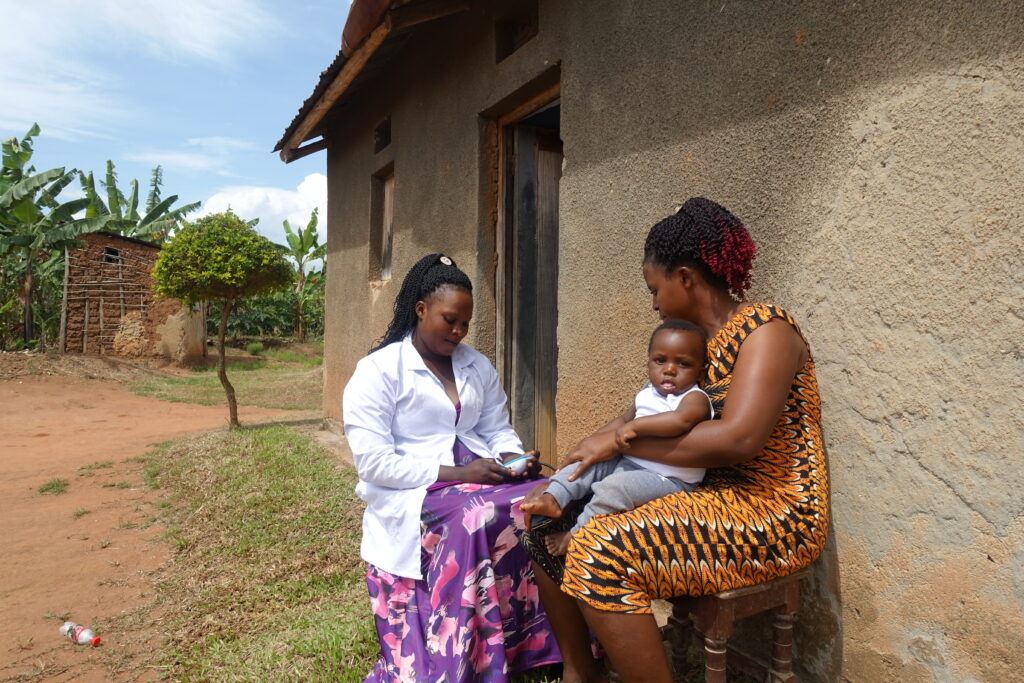
A mother and interacts with a medical worker during a medical outreach. Photo by Akram Ndawula.
The couple had to part with a 2.5 million medical bill, whereupon it was supported by a joint community saving group.
Kobutungi belongs to a mothers maternity savings group, a kind of a community health insurance scheme where mothers meet and save money for a “rainy day” during pregnancy.
“We had to borrow from the group. And that is how we were able to manage the cost at that time,” she shares, explaining that the medical bill would have perhaps strained the family’s welfare.
The mothers’ resource mobilization model is being supported by Vital Care Connect, a non-profit organization dedicated to improving maternal and infant healthcare in these low resource setting communities.
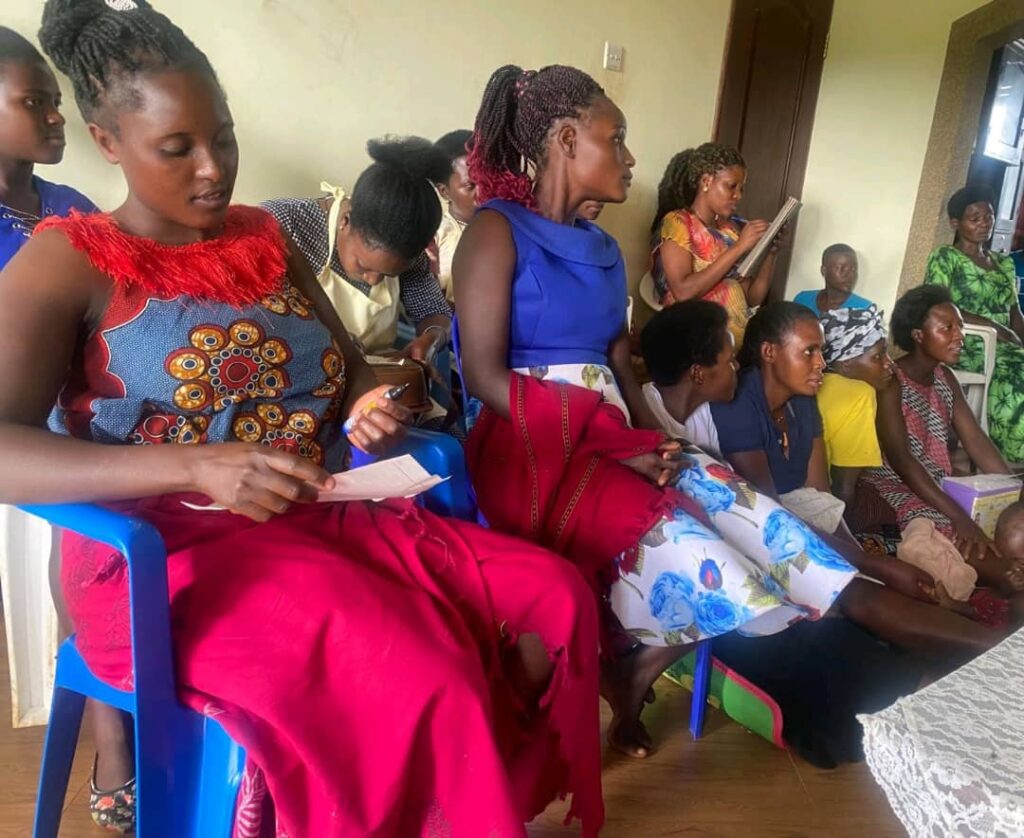
Mothers gather for their savings get-together. Photo by Akram Ndawula.
Founded by Mackline Kobusingye, the organization connects rural features such as social solidarity, with the available public health infrastructure to improve maternal and child healthcare in hard-to-reach areas.
In their savings clubs, mothers pool UGX 5,000 (about $1.5) monthly for childbirth emergencies each and it is kept and offered in support when they are due.
On top of this, each member of this club is mandated to raise up to 2000 every month, which is used to transport health workers for a maternal health monthly camp since their community is far from the health center.
In the outreach, the healthcare workers assess the mothers for any healthy complications which can be mitigated if detected. They also provide antenatal health information, counselling, checkups, childbirth education, family planning, nutrition aid, safe birth kits, and postnatal care in the villages.
“We bring this treatment closer because women are not just choosing to give birth at home, they feel they have no other choice. If they don’t have money or someone they know at the health facility, they would rather stay where there’s at least a familiar hand to support them than walk for hours, wait endlessly, and leave their families hungry,” Kobusingye says.
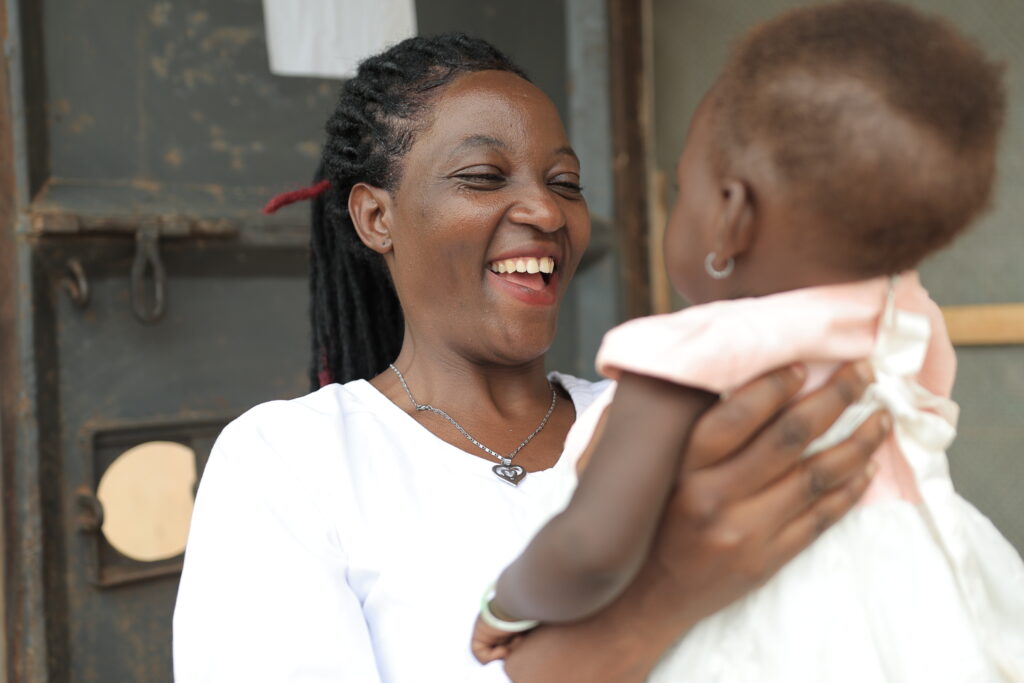
Mackyline Kobusingye holds a baby during a maternal community outreach. Photo by Akram Ndawula
According to Asaph Ankunda, the community outreach coordinator at Vital Care Connect, the model works with Village Health Teams (VHTs), who are the first point of patient contact, and responsible for basic health interventions within local communities and villages in Uganda’s health structure.
The VHTs collect data and inform the organization about the challenges in their community.
When the mothers collect the transport fees, the VHTs collaborate with local village leaders (LC1) to set up makeshift treatment centers in schools, mosques, churches, and even football fields, ensuring that patients receive care in a private and dignified setting.
“ At times we do door to door because you find that some mothers won’t come because their husbands refuse them. So we go there and educate them about the importance of the camp,” says Ankunda, explaining the complexity of social issues around maternal healthcare.
Vital Care Connect has also incorporated a home-based care health education and counseling program.
A couple and their family is therefore met in private at their homes to discuss the care of pregnant mothers and infants.
By offering counseling and one-on-one discussions with health professionals, many of these challenges are addressed. These inclusive sessions have seen more male participation and reduced gender-based violence in homes.
“After these sessions, we see real change. A man who once abused his pregnant wife may stop, begin helping with house chores, and even remind her about antenatal appointments. Some even reach out to us for guidance regarding their partner’s pregnancy. It’s encouraging to see such transformations,” Kobusingye adds.
At the clinic, expectant mothers not only receive medical care but also free safe birth kits, pre-packaged sets of essential supplies designed to ensure a clean and safe childbirth, particularly in low-resource settings.
Sarah Nabulya, who oversees the packaging of these kits, emphasizes their role in preventing infections like sepsis by providing sterile tools for cutting the umbilical cord and maintaining hygiene during delivery.
“These kits contain all the essentials needed by both the midwife and the mother during childbirth. They include delivery sheets, baby diapers, gloves, sanitary pads, washing soap, detergent, baby socks, breast pad, towel, wipes, and cotton, among other items. These are life saving essentials that most families can’t afford,” Nabulya explains.
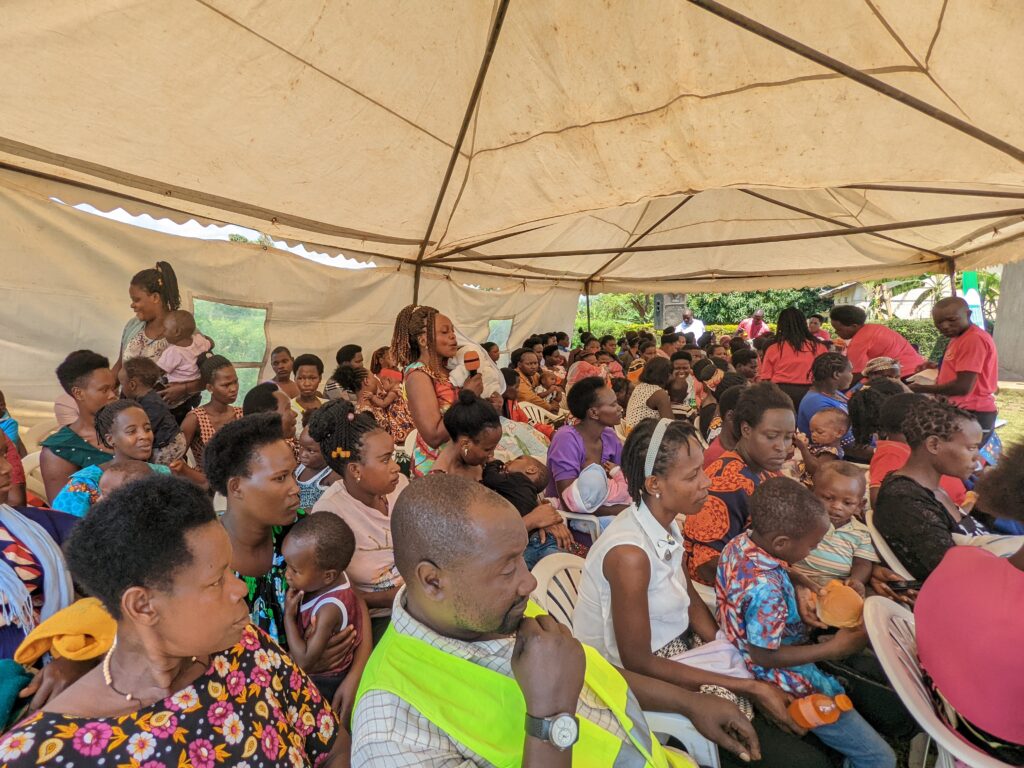
A mother shares her nutritional approach with the community during an outreach. Courtesy photo.
For sustainability, the organization sells birthkits to mothers outside low-resource communities at UGX 20,000 to UGX 35,000. A portion, 40% of the proceeds goes back into funding camp activities, ensuring that expectant mothers attending the camp receive the birth kits free of charge.
The camp serves not only pregnant mothers but also those struggling with child nutrition and have seen the reduction of malnutrition for children under five. Mothers with malnourished children receive free nutritious porridge to help their babies regain strength.
Uganda still struggles with healthcare financing, which has left many public facilities unable to meet the growing demands from the population. Yet out-of-pocket spending on healthcare is high, representing a significant burden for many low-income families.
According to the Inter Parliamentary Union on Maternal and Child Health in Uganda, complications during pregnancy, such as hypertension, miscarriage, sepsis, unsafe abortion, hemorrhage, and embolism, claim the lives of many mothers.
And those who survive the complications often succumb to malaria, diabetes, hepatitis, and anemia, conditions that are worsened by pregnancy.
It further indicates that maternal morbidity in the country stands at 62% as 36% of women in rural areas are delivering outside health facilities, without skilled care, and essential drugs and medicines.
“The most frustrating part was traveling such a long distance only to find no medication. They would tell me to come back, yet sometimes I didn’t even have money for transport. This happened multiple times. Maybe if the medicine had been available, I wouldn’t have gone through what I did,” Kabutungi shares with disappointment.
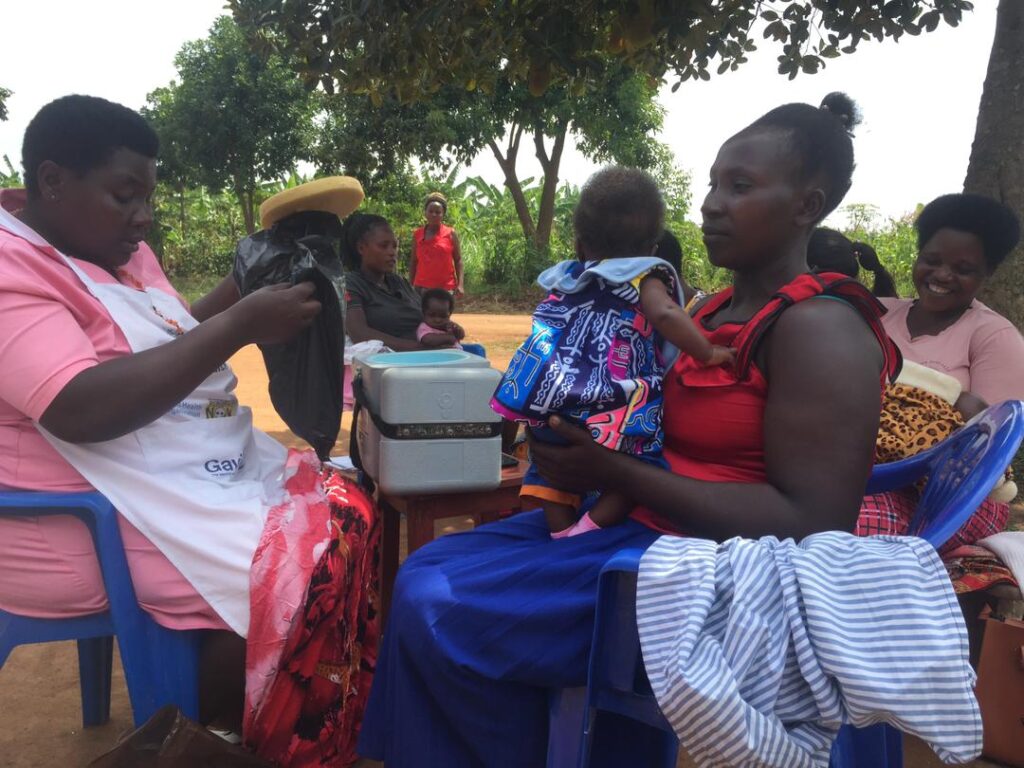
A health worker prepares to immunize a child during the mobile community outreach. Photo by Akram Ndawula.
The World Health Organisation reports that to improve maternal health, barriers that limit access to quality maternal health services must be identified and addressed at both health system and societal levels.
That is to say, poor quality of care, including disrespect, mistreatment and abuse by health workers, insufficient numbers of and inadequately trained health workers, and poor accountability of health systems.
Other barriers include low income and limited access to education, which prevent expectant mothers from seeking the healthcare they need. For instance, nearly 33.8% of the rural population lives in poverty, making it difficult for mothers to afford essential necessities during pregnancy, such as antenatal care.
Irene Nalwoga, a Senior Midwife at Mpigi Health Center IV, explains that antenatal care is a lifeline that connects a mother to the resources and care she needs during pregnancy.
“Missing even one visit can mean the difference between life and death. We cannot stress enough how early detection and regular monitoring of both the mother and the baby can prevent many of the complications we see in emergencies,”
And yet, for many women like Kabutungi, quick access to antenatal care is a luxury at a distance. The absence of nearby healthcare facilities within a five-kilometer radius, inadequate medical transport options like ambulances, and the financial burden of out-of-pocket medical expenses keep them from seeking help until it’s too late.
Besides, most of the women in low resource settings are unaware of the signs of danger during pregnancy, and without regular check-ups, they remain vulnerable to complications that could otherwise be detected and managed.
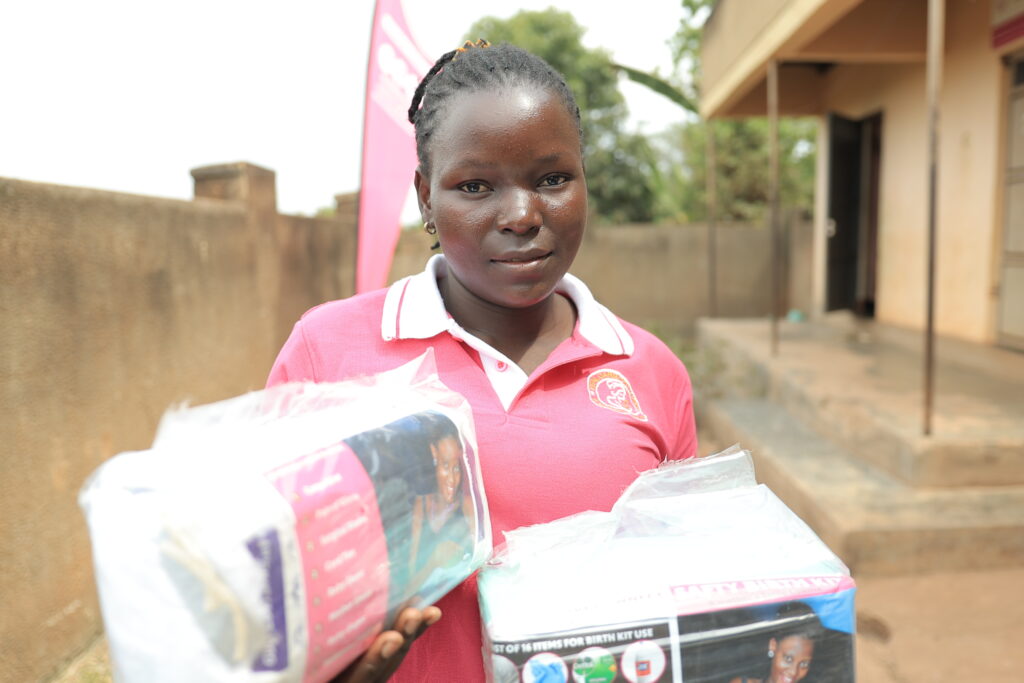
A medical worker shows pre-packaged birth kit prepared for mothers in remote areas. Photo by Akram Ndawula.
The organization says it was prompted to factor in malnutrition responses after recording that one in five mothers has a child suffering from malnutrition. In Uganda, more than a third of children under five are stunted, and undernutrition contributes to 4 out of 10 child deaths.
Across rural communities, many mothers face challenges such as poverty, inadequate nutrition, and breastfeeding difficulties, leaving their babies dangerously underweight.
Seven months ago, Christina Nalule gave birth to her daughter, Martha. However, breastfeeding did not come easily for Nalule, and with each passing day, Martha’s ribs became more visible.
With support from the camp, Martha has now gained weight, increasing from 3 kg to 9 kg.
After assessing her condition, she was given a highly nutritious porridge made from millet flour, pumpkin flour, banana flour, rice flour, and powdered mukene (tiny silverfish).
“She is still weak, but I can see the difference. She no longer cries endlessly from hunger. I have hope now. She is eating, and she is getting stronger. I am happy,” Nalule says, watching her baby swallow slowly.
Since its founding in 2022, the model has provided antenatal care to over 1,0000 women, prenatal care to 7,485 mothers, and distributed 8,200 birth kits and nutrition support to those in need.
It operates with a team of six medical professionals, serving all 10 villages in Rugaaga, Kyarukumba, and Kukunama, located in Ibanda district.
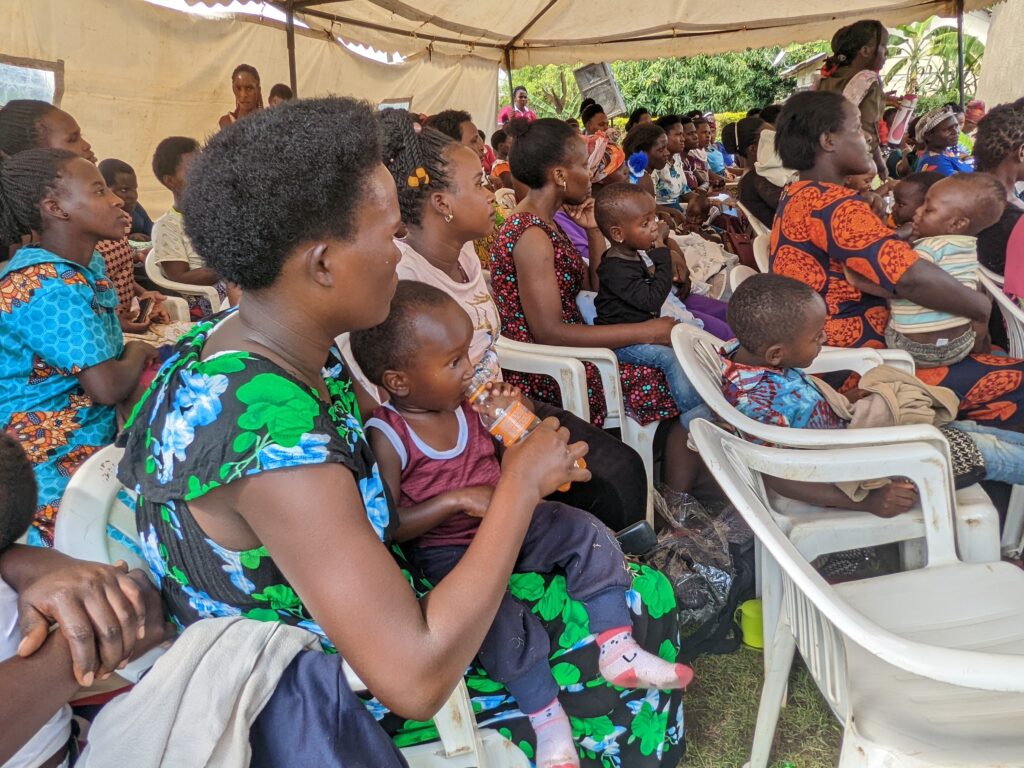
With the camp’s presence, pregnancy-related fears have become a thing of the past. For mothers like Kabutungi, her second pregnancy was a completely different experience—this time, she had the clinic by her side.
“When I felt pain, the nurse was always there to check on me. By the time I was ready to give birth, they ensured I got to the hospital safely. No last-minute rush, no fear of not affording care,” she says, gently brushing her fingers over the cheek of her second-born, Ritah Nsiima.
However, bringing these essential services closer to the people comes with its challenges. Kobusingye points out that myths and misconceptions about pregnancy remain widespread.
For instance, some women believe that newborns should not be bathed for a month after birth. Yet, without proper hygiene, babies are highly vulnerable to infections.
Others rely on traditional beliefs, such as using specific herbs, either for bathing or consumption at certain stages of pregnancy, believing it can reposition the baby in the womb.
Such misinformation often leads to complications during pregnancy or after birth. By the time some mothers seek medical help at the clinic, their condition, or that of their baby is already critical.
For women like Kabutungi, Nalule, and for thousands of other mothers, it means no more dangerous delays, no more life-or-death decisions based on money or distance.
“These mobile clinics are not just a service. They are our second chance at life, and for the babies we hold close.” Kabutungi concludes.
© 2022 - Media Challenge Initiative | All Rights Reserved .
© 2022 - Media Challenge Initiative | All Rights Reserved .